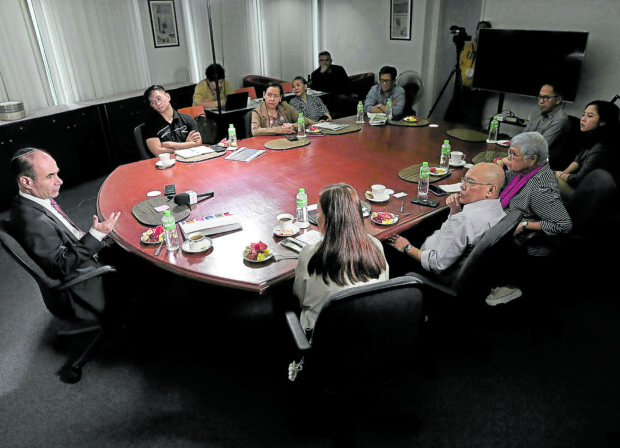
ROOTS OF CONFLICT | Israel Ambassador to the Philippines Ilan Fluss meets with Philippine Daily Inquirer editors and staff on Tuesday, Oct. 31, 2023, to discuss issues related to the Israel-Hamas conflict. (Photo by RICHARD A. REYES / Philippine Daily Inquirer)
MANILA, Philippines — Israel is pleased to have an ally in the Philippines, which has “no history of antisemitism” and one of the few safe places in the world where Jewish people can live free of discrimination especially in a time of war in the Gaza Strip, according to Tel Aviv’s Ambassador to Manila Ilan Fluss.
“You see it in different parts of Europe, you see it in the US (United States), you see it in Arab countries, but not here,” the ambassador noted during a visit to the Inquirer on Tuesday.
This likely stemmed from the Philippines’ own experience of being a country victimized by World War II, when it became one of the fiercest battlegrounds between American and Japanese forces that left many areas in Manila and other provinces in ruin.
The federal government-funded US Holocaust Memorial Museum defines antisemitism as prejudice against or hatred of Jews as individuals and as a group.
It said antisemitism is based on stereotypes and myths that target Jews as a people, their religious practices and beliefs, and the Jewish state of Israel, adding that hatred of Jews can take many forms, including violent attacks.
PH support
Historically, it said that what began as a conflict over religious beliefs evolved into a systematic policy of political, economic, and social isolation; exclusion, degradation, and attempted annihilation.
The Holocaust, during which the Nazis and their collaborators murdered 6 million Jews, is the worst example of antisemitism in history. It was in the late 1930s, as the war loomed over Europe when then President Manuel Quezon approved the grant of visas to 10,000 Jews fleeing the Nazis. Close to 1,300 eventually made it to the Philippines.
Fluss said the Jewish community would never forget this episode.
In 1947, the Philippines was also one of the 33 countries that voted to recognize Israel as a sovereign state after the war. In 1957, the two countries established full diplomatic relations.
“I think this has been expressed again in the abstention. We don’t feel the discrimination here [of Jews],” Fluss said, referring to Manila’s decision not to vote on the United Nations General Assembly’s resolution last week calling for a humanitarian ceasefire in Gaza—but without condemning the Oct. 7 Hamas attack on Israel that killed 1,400 Israelis and foreigners, including four Filipinos.
Real threat
Following the latest eruption of conflict between Israel against the Palestinian militant group Hamas, Fluss said, Jewish communities around the world were again experiencing discrimination and falling victim to hate crime.
“We are experiencing a growing amount of attacks against Jews to an extent I don’t think people understand; Jews around the world are now hiding any Jewish symbols in order to prevent being attacked. This is unbelievable,” he said.
Still, several demonstrations by various groups in support of the Palestinian people have been held in Metro Manila, Pampanga, and Mindanao since the war in Gaza broke out.
In previous interviews, Fluss said he was “shocked and disturbed” to see Filipino demonstrators burning the Israeli flag.
On Tuesday, the ambassador urged the demonstrators to also call out Hamas for starting the latest wave of violence.
“It’s important for people to learn and understand what is happening now, what this war is all about. And I call upon them — it’s OK to demonstrate in support of the Palestinians — but let them really demonstrate against the real source of this war, [Hamas] which is a threat to Israel, the Philippines, and the international community,” he said.